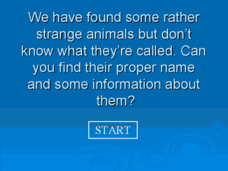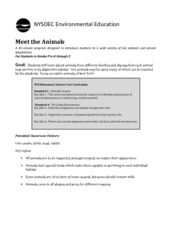Curated OER
Learning to Resist: Watercolor
Consider wax resist drawings as a way to bridge art and science. Learners view, discuss, and practice drawing insects or animals using waxy crayons. They pay attention to the creature's features as they create images with watercolor and...
Curated OER
Classify Animals
Give your class an idea of how animals are classified by scientists with this interactive PowerPoint activity. They are presented with six different animals, they answer yes or no questions until only one animal remains alongside...
Curated OER
What Do They Eat?
What does a monkey eat? How about a squirrel? Introduce your young scholars to different types of eaters in the animal kingdom with this cut-and-paste activity. Learners assess 6 animals: a squirrel, a frog, a monkey, a seal, a dog, and...
Curated OER
Reptiles and Amphibians
Introduce your class to various reptiles and amphibians. They will meet and identify a representative from each of the four major reptile families, then learn about and discuss reptile characteristics. Next, they will identify and...
Curated OER
Animal Characteristics
Allow your students to review what they learned about animal characteristics with this PowerPoint. This slideshow includes 9 multiple choice questions and an answer key at the end. Tip: You can use this as an assessment by having your...
Curated OER
Track Traces
Students explore animal characteristics by participating in an animal anatomy activity. In this animal tracks lesson, students identify the differences between specific animals and the shape of their footprints. Students utilize a...
Curated OER
Biodiversity
Short and sweet, this presentation introduces tiny scientists to biodiversity. They view pictures of three different dogs and four different spiders and compare their physical characteristics. Explorers are then sent outdoors to find...
Curated OER
Tallying Animal Characteristics
Take a trip to the farm! While examining an image of farmyard animals, learners make two separate tallies: animals with two legs and animals with four legs. Then, they add up the numbers to find the total number of animals. They could...
Curated OER
Animal Feeding Strategies
How do different animals eat? This cross-curricular activity has biologists describing types of eaters and giving examples. Eight short-answer questions prompt learners to identify a carnivore, herbivore, omnivore, insectivore, predator,...
Curated OER
Animals Are Different
Each animal is different! Showcase animal characteristics through a series of questions based on simple images of well-known animals. This learning exercise has learners examining 8 animals: rabbit, penguin, parrot, dolphin, bear,...
Curated OER
Meet the Animals
The class will examine a series of live or stuffed animals in order to learn how different animals survive in distinctive habitats. As they examine each animal, they will be asked a series of critical thinking questions geared at getting...
Curated OER
Animals and Plants: 1st Grade Science
First graders will have a better grasp on animal characteristics after viewing this presentation. The concepts covered are, skin, life cycle, offspring, size, and human/animal interrelationships. Note: This is good as a concept review or...
Curated OER
Is a bat a bird?
Provide a concise description of why a bat is not a bird by comparing their traits. This presentation defines both birds and flying mammals, explaining how they are similar and how they are different. Note: This PowerPoint is great for...
Curated OER
Animal Characteristics
Students investigate biology by completing a group classification activity. In this animal characteristics, students discuss the different families in the animal kingdom and the small differences that separate the animals. Students...
Curated OER
American Black Bear
Students analyze animal characteristics by creating an interactive presentation. In this black bear instructional activity, students identify the geographic location, characteristics and history of the American black bear by researching...
Curated OER
Animals Jeopardy
This animal science PowerPoint enables young scholars to review the habitats and body parts of animals by participating in a Jeopardy review game. This interactive review game includes illustrations of animals as well.
Curated OER
Hands on Biome-Building
Students explore Earth science by participating in an environment activity. In this biome lesson, students discuss the importance of a healthy ecology in order to sustain life, both animal and plant. Students utilize a cardboard or wood...
Pennsylvania Department of Education
Animal Classes and Their Ecosystems
Students explore animal characteristics by participating in an environment identification activity. In this animal habitat lesson, students discuss a range of different wild life and the ecosystems that they are a part of. Students view...
Curated OER
Awesome Adaptations!
Second graders explore biology by researching animal characteristics. In this adaptation lesson, 2nd graders identify the history of several animals and research the changes that have occurred to their anatomy over thousands of years....
Curated OER
Reptiles and Amphibians
Fourth graders explore biology by viewing animal videos in class. In this amphibian and reptile lesson, 4th graders identify the key differences between reptiles, amphibians and other animal classifications. Students view video clips in...
Curated OER
Animal Movement in Water
Students explore oceanography by participating in field trip activities. In this fish characteristics lesson, students attend a trip to a local beach or reservoir and collect different specimens in order to examine them. Students...
Curated OER
Fable of the Fainting Goat
Second graders explore animal life by reading children stories in class. In this goat fable lesson, 2nd graders read several books which describe the different myths and folklore about goats. Students identify the needs of living animals...
Curated OER
Hawaiian Bird Beak Adaptation
Students explore adaptation by participating in a lab activity. In this bird characteristics instructional activity, students discuss the different purposes birds have for their beaks and conduct an experiment testing which beaks collect...
Curated OER
Animal Coverings
Students read a book. In this animal characteristics lesson, students read the book Animal Coverings, answer comprehension questions, and complete a chart where they match animals with their coverings.

























